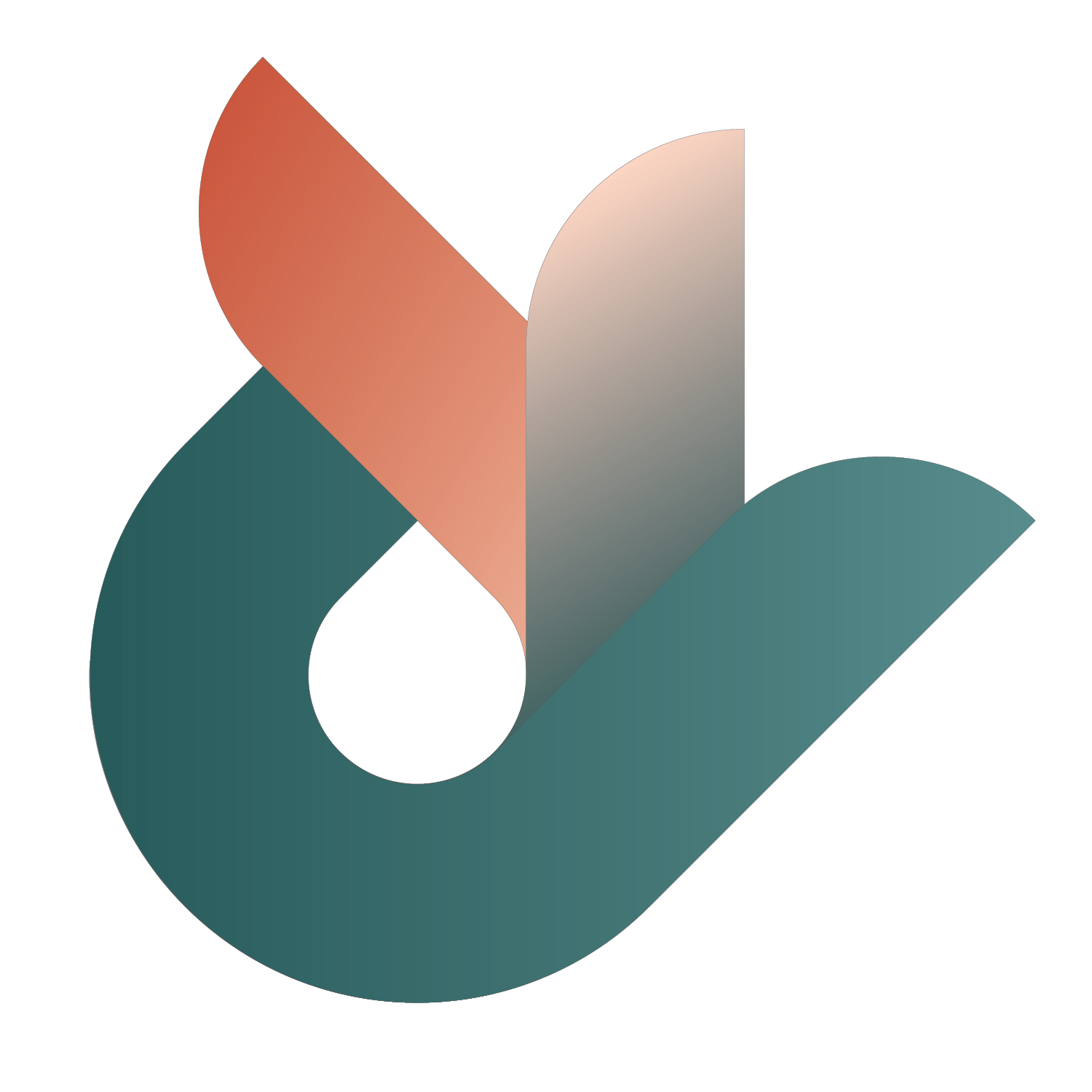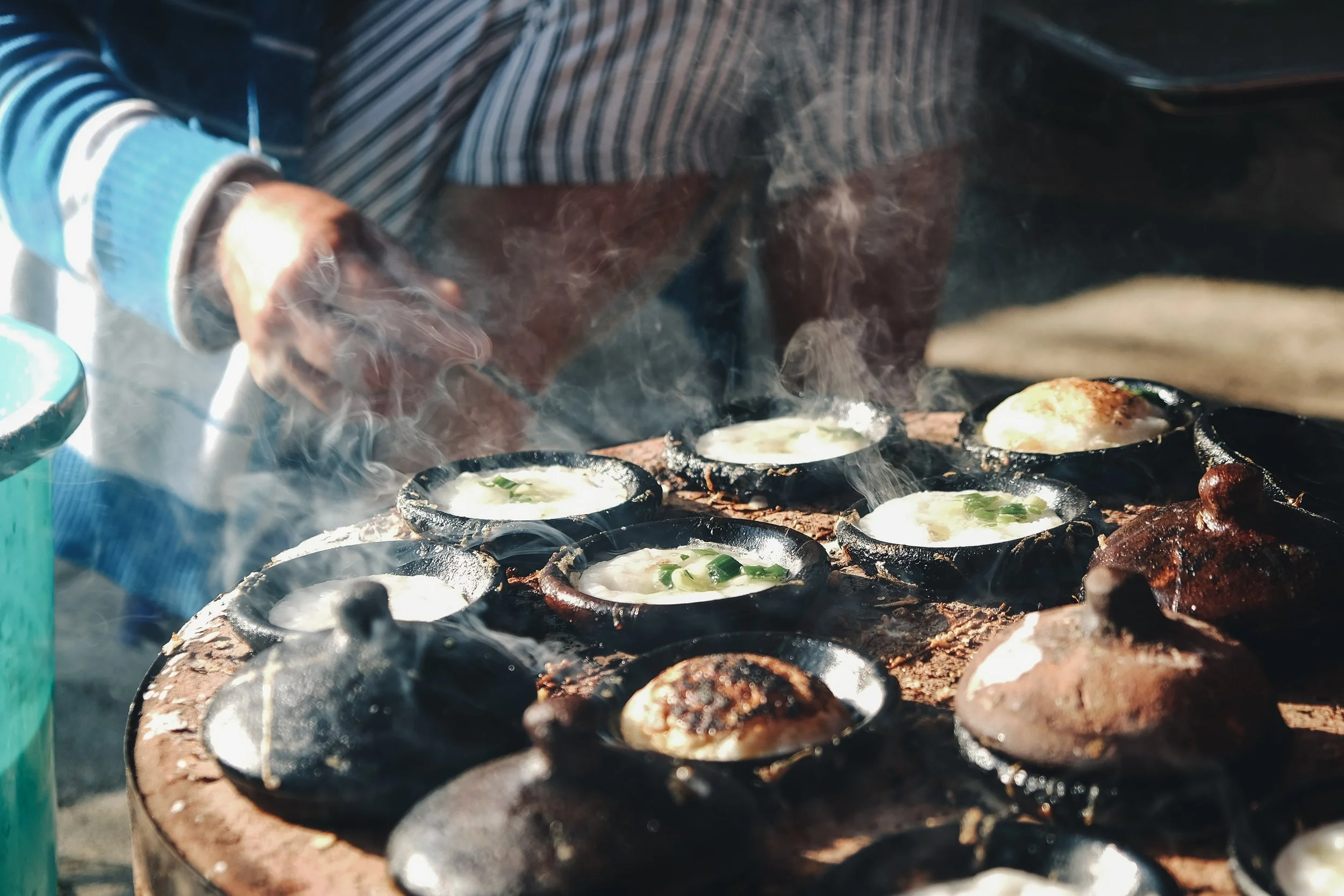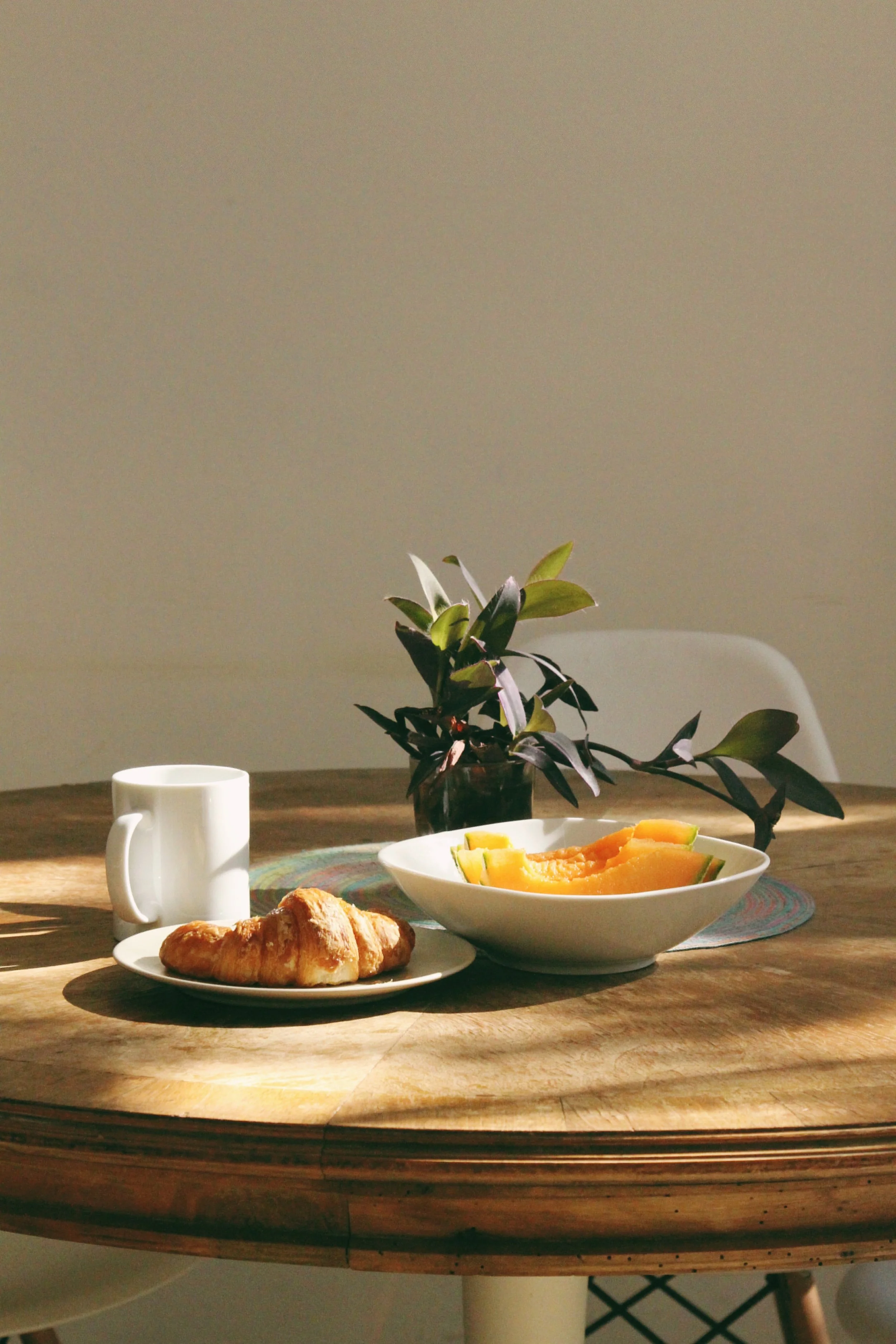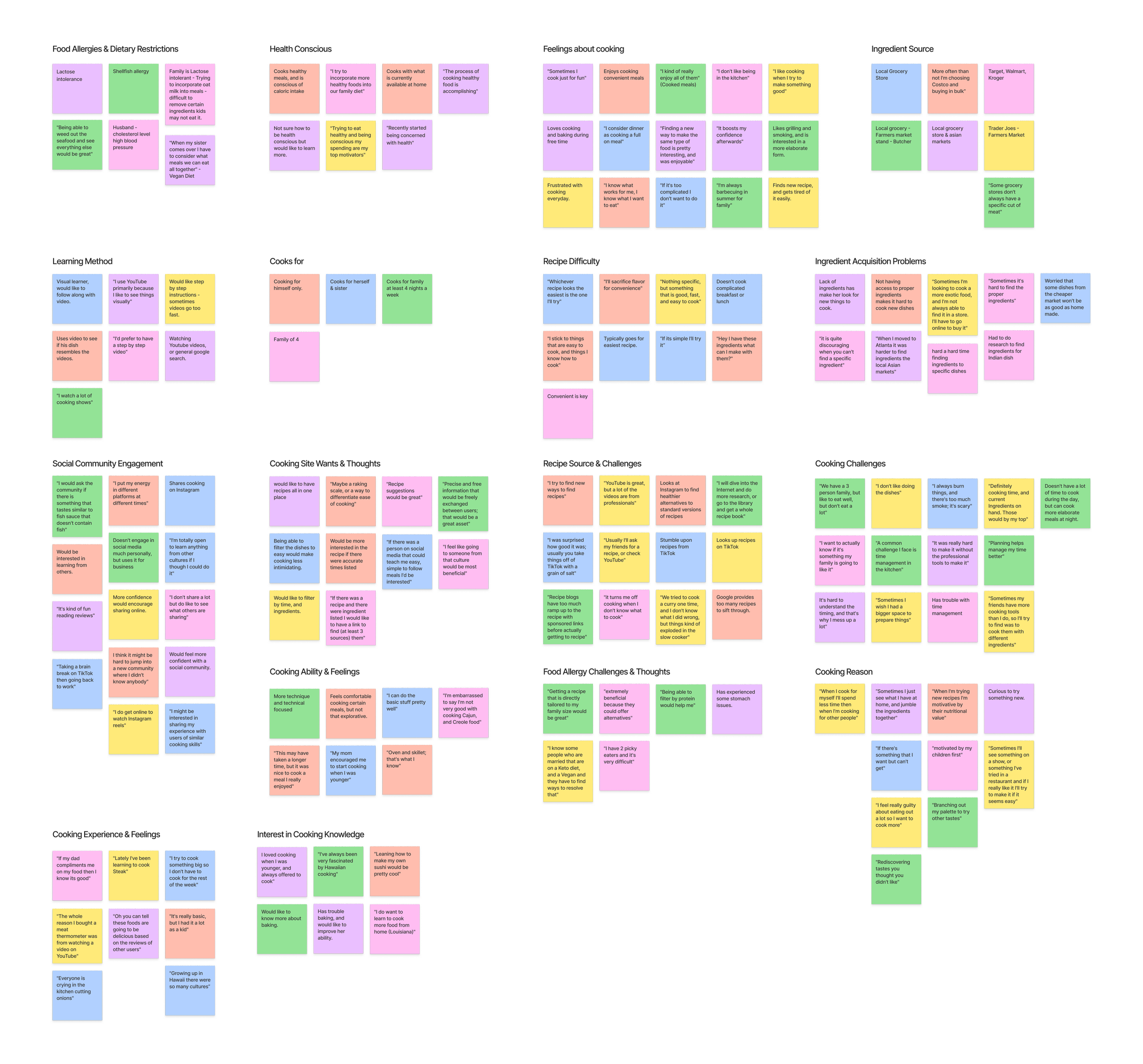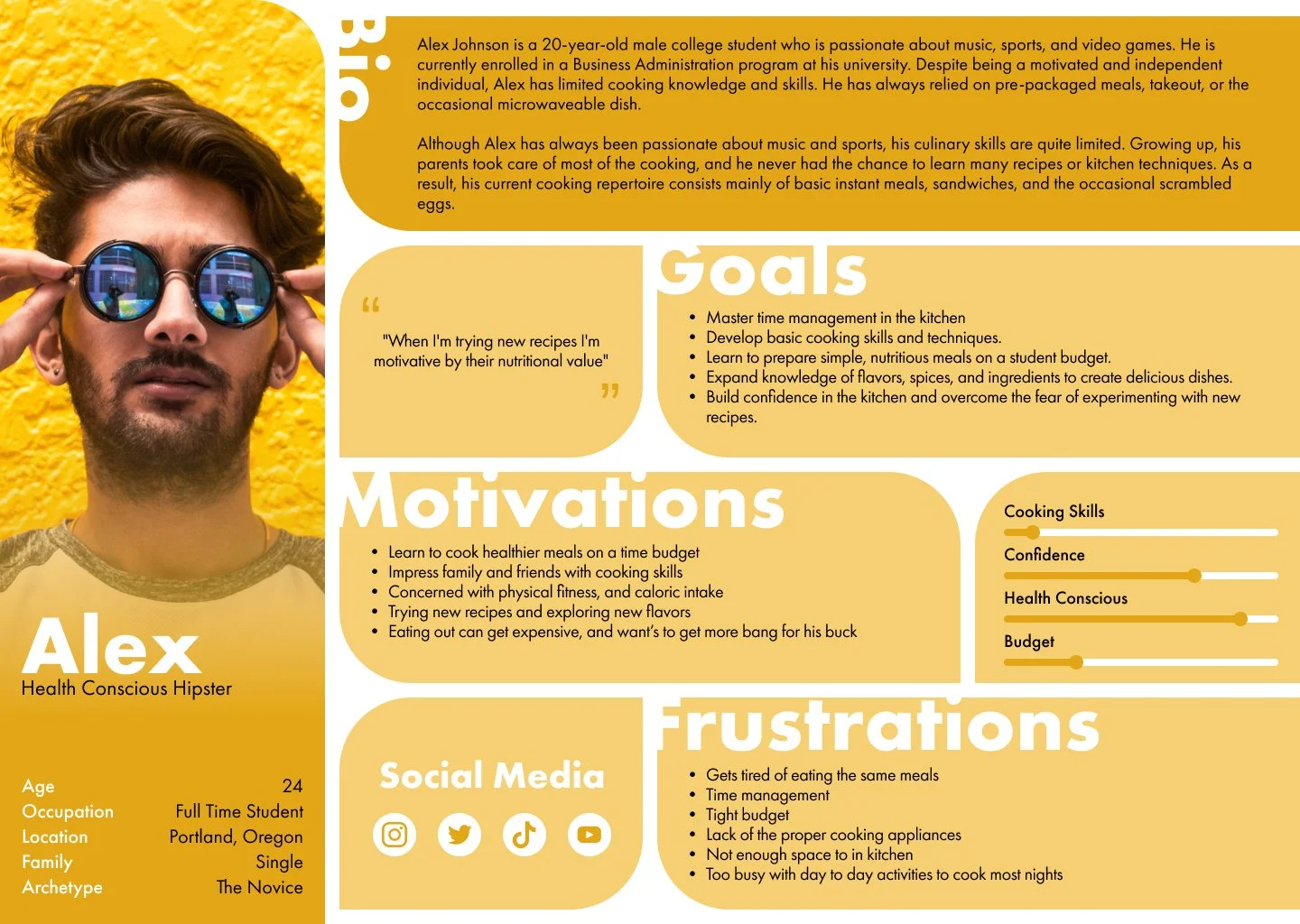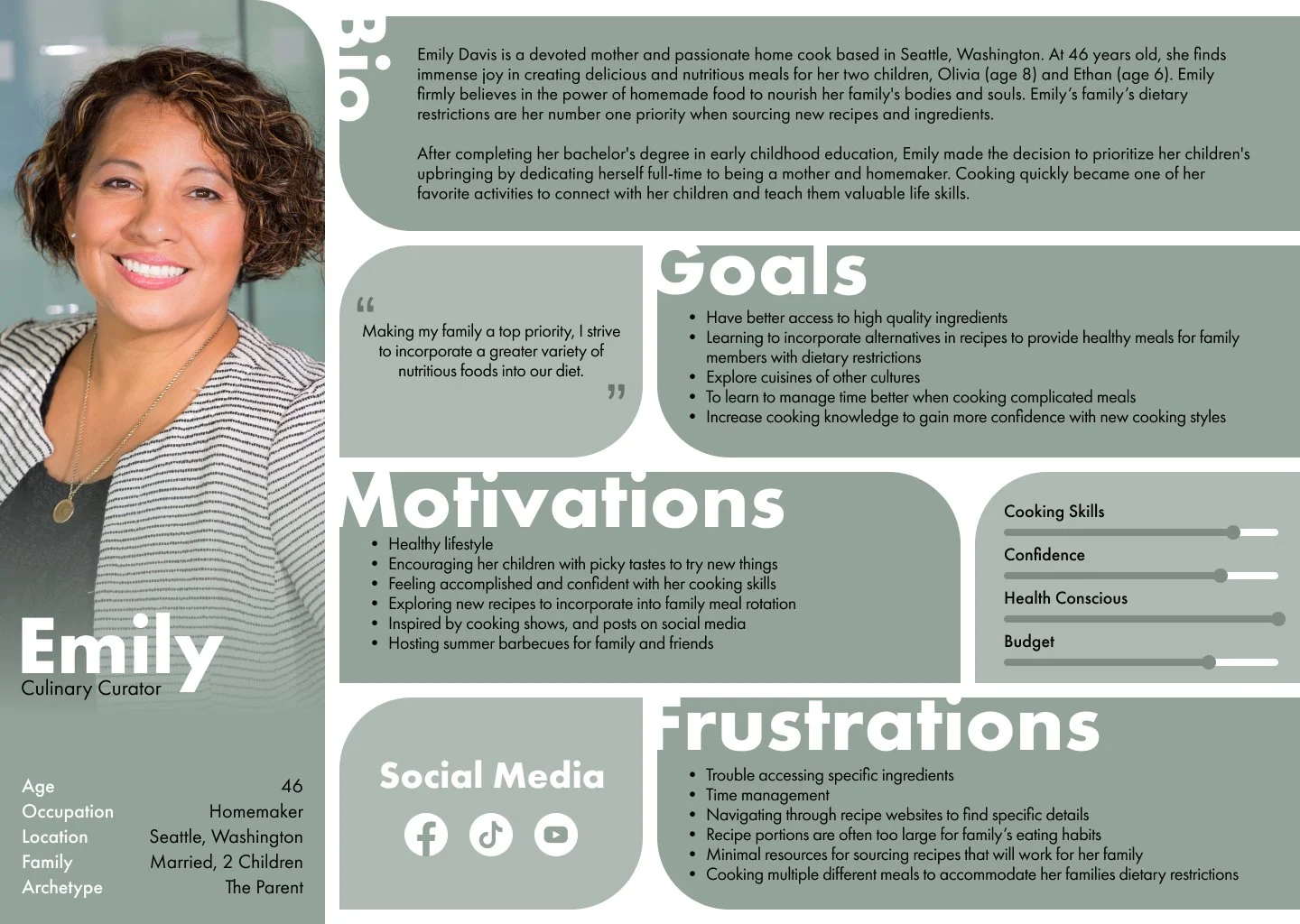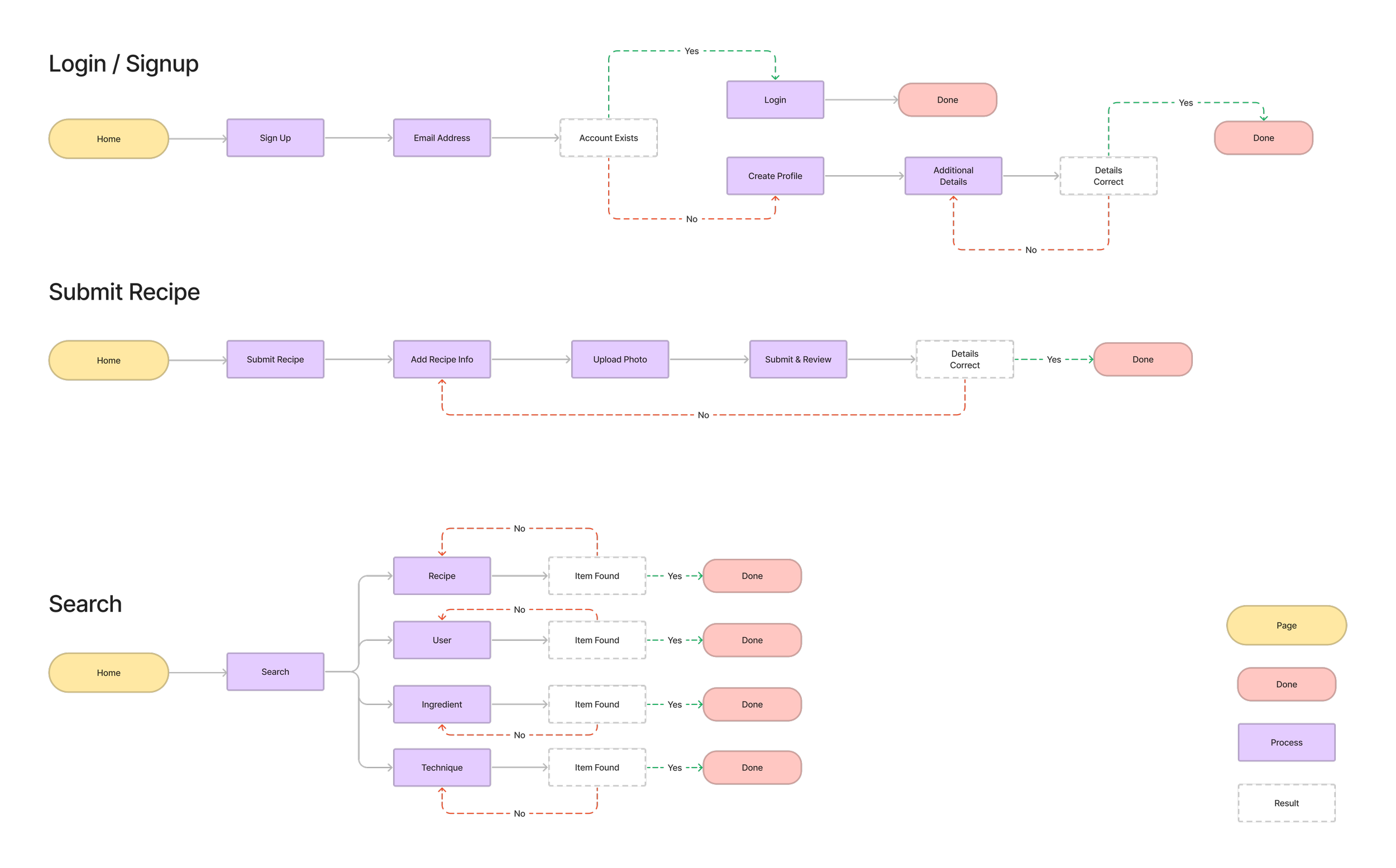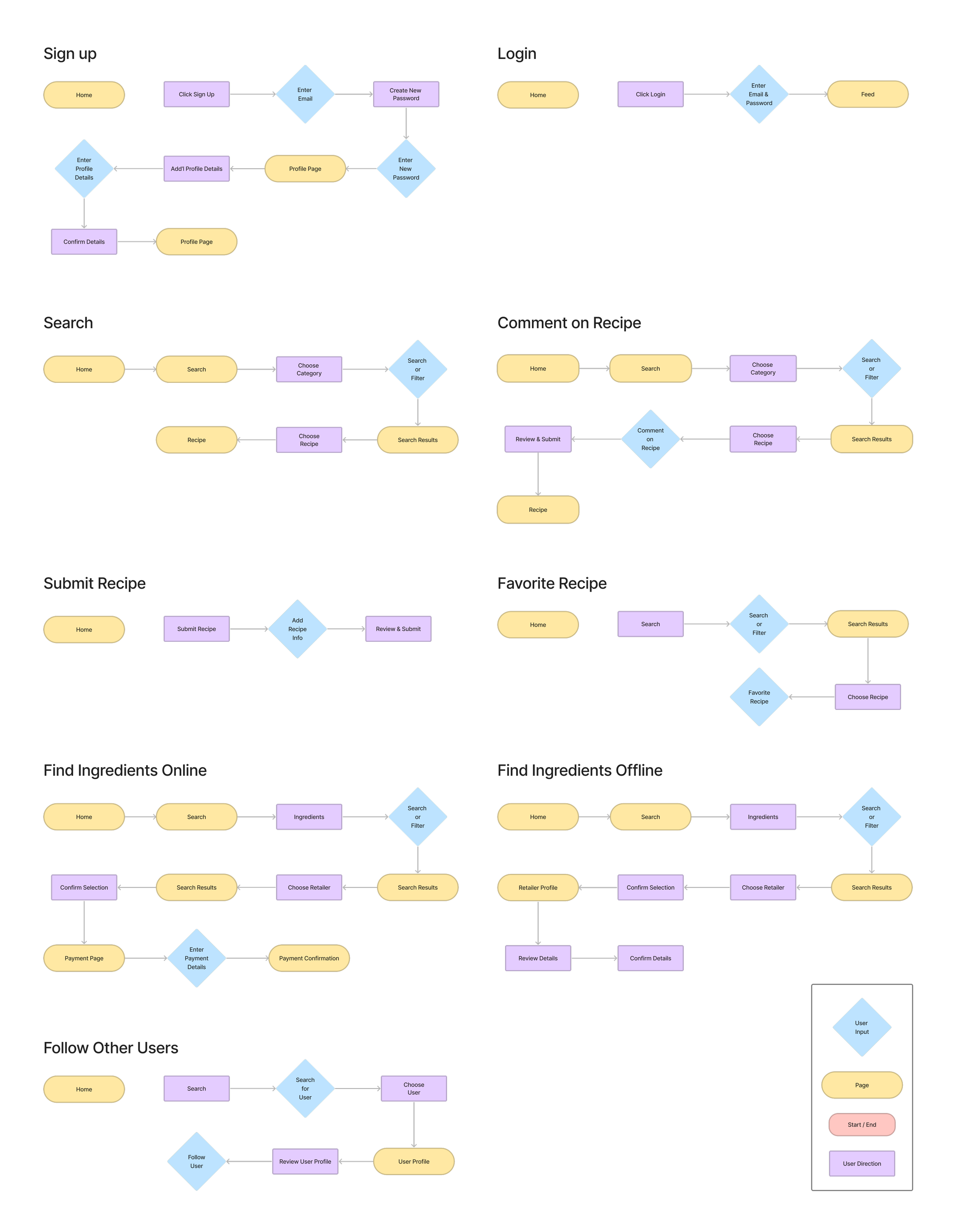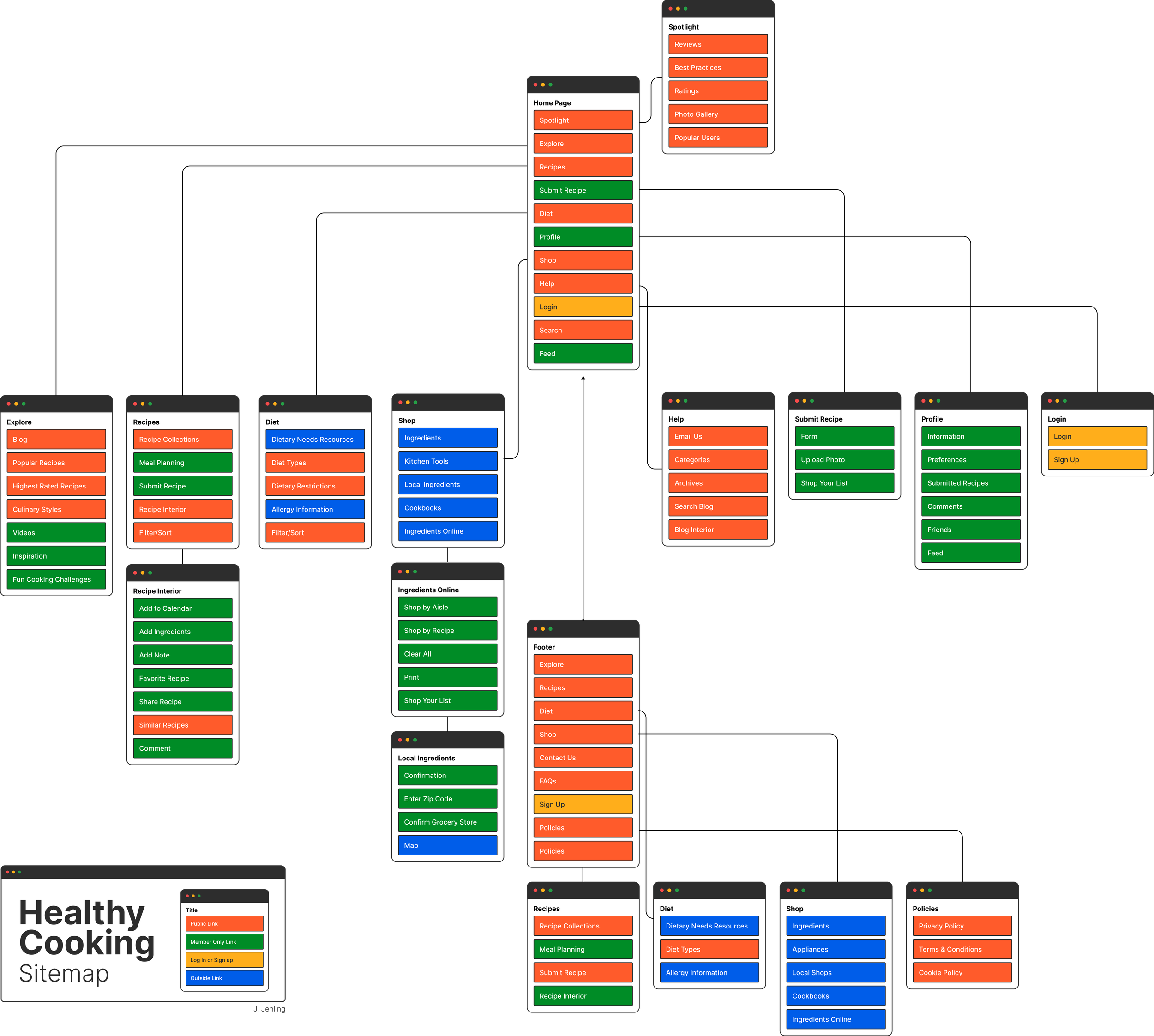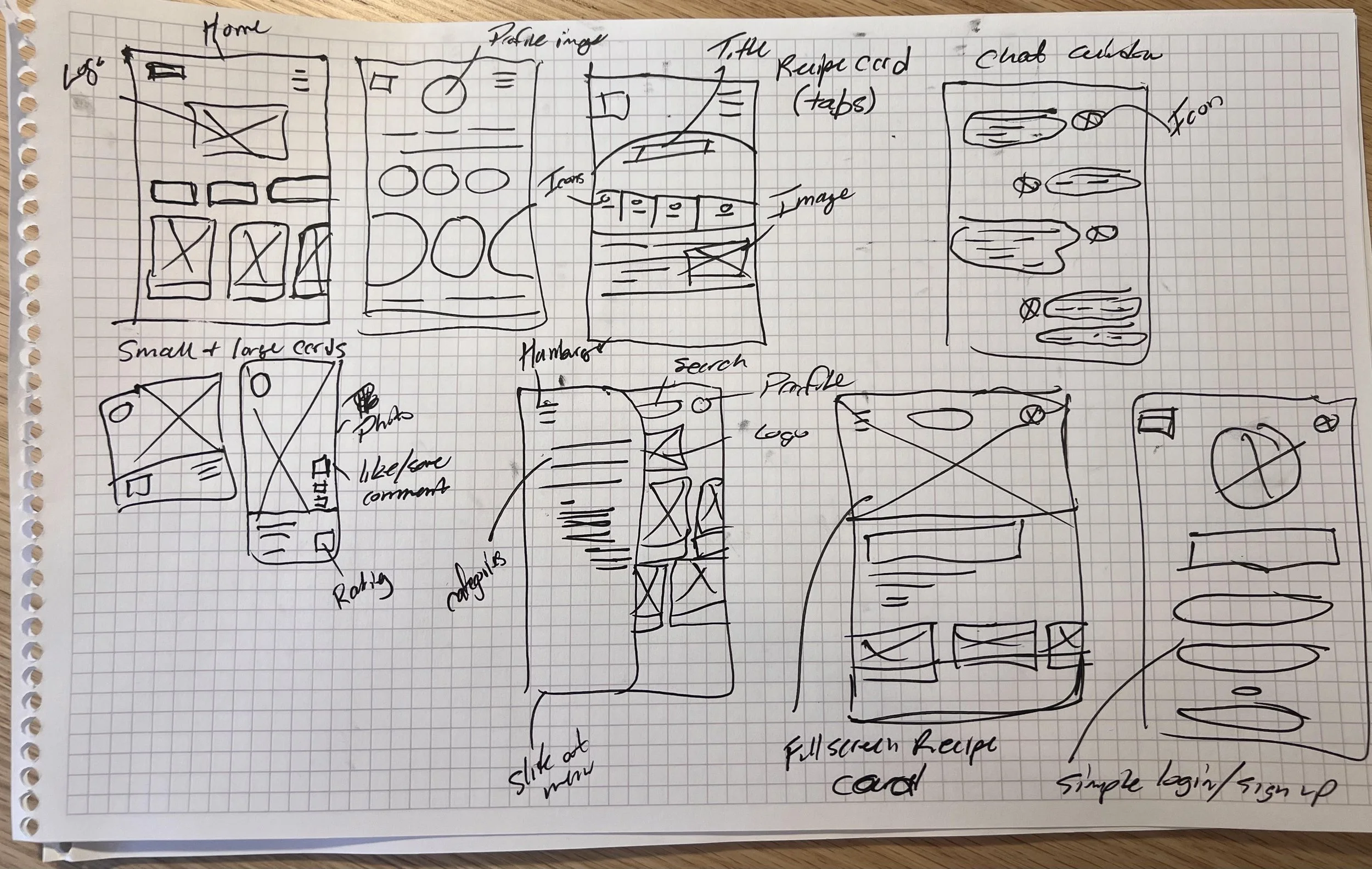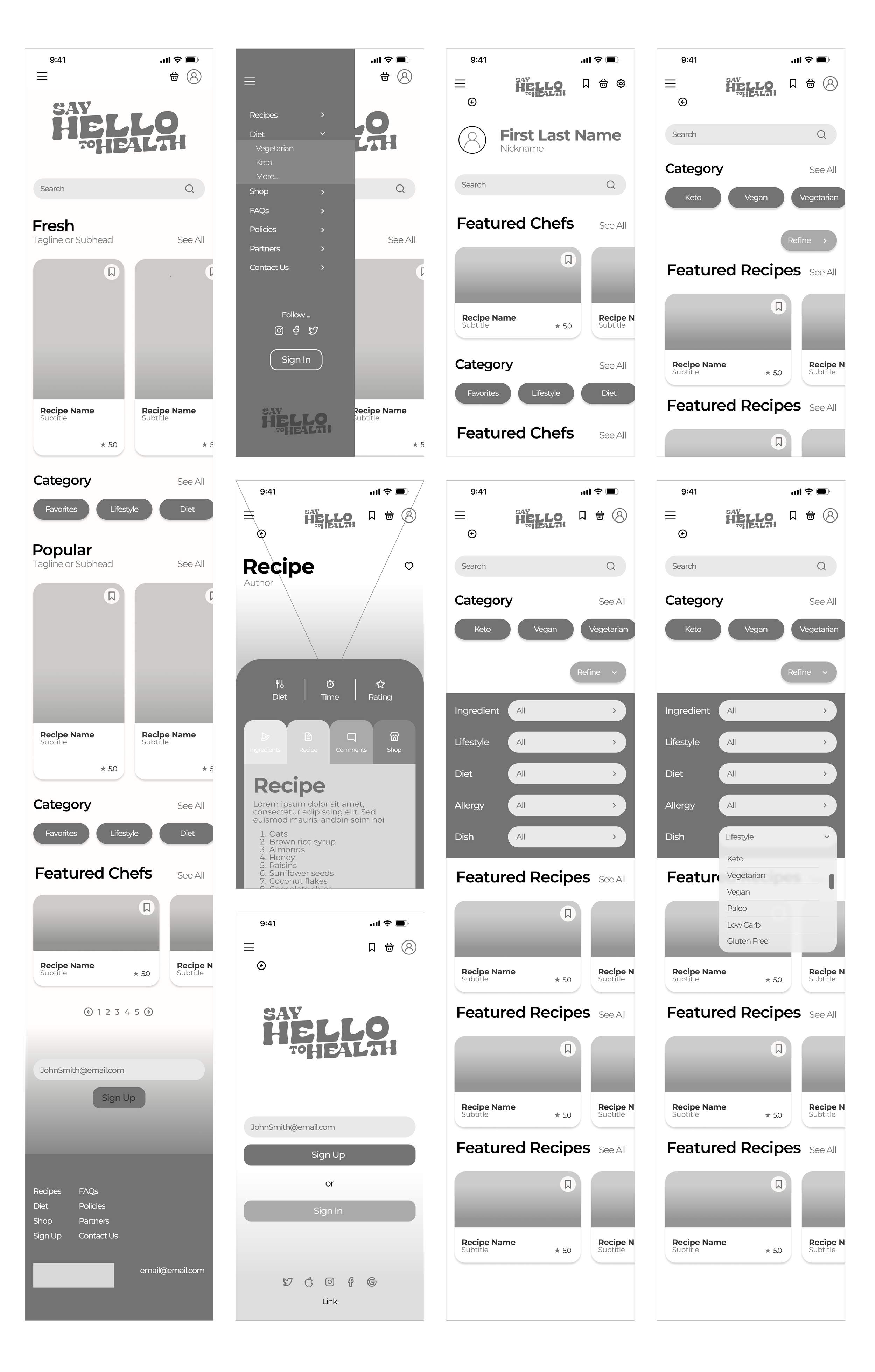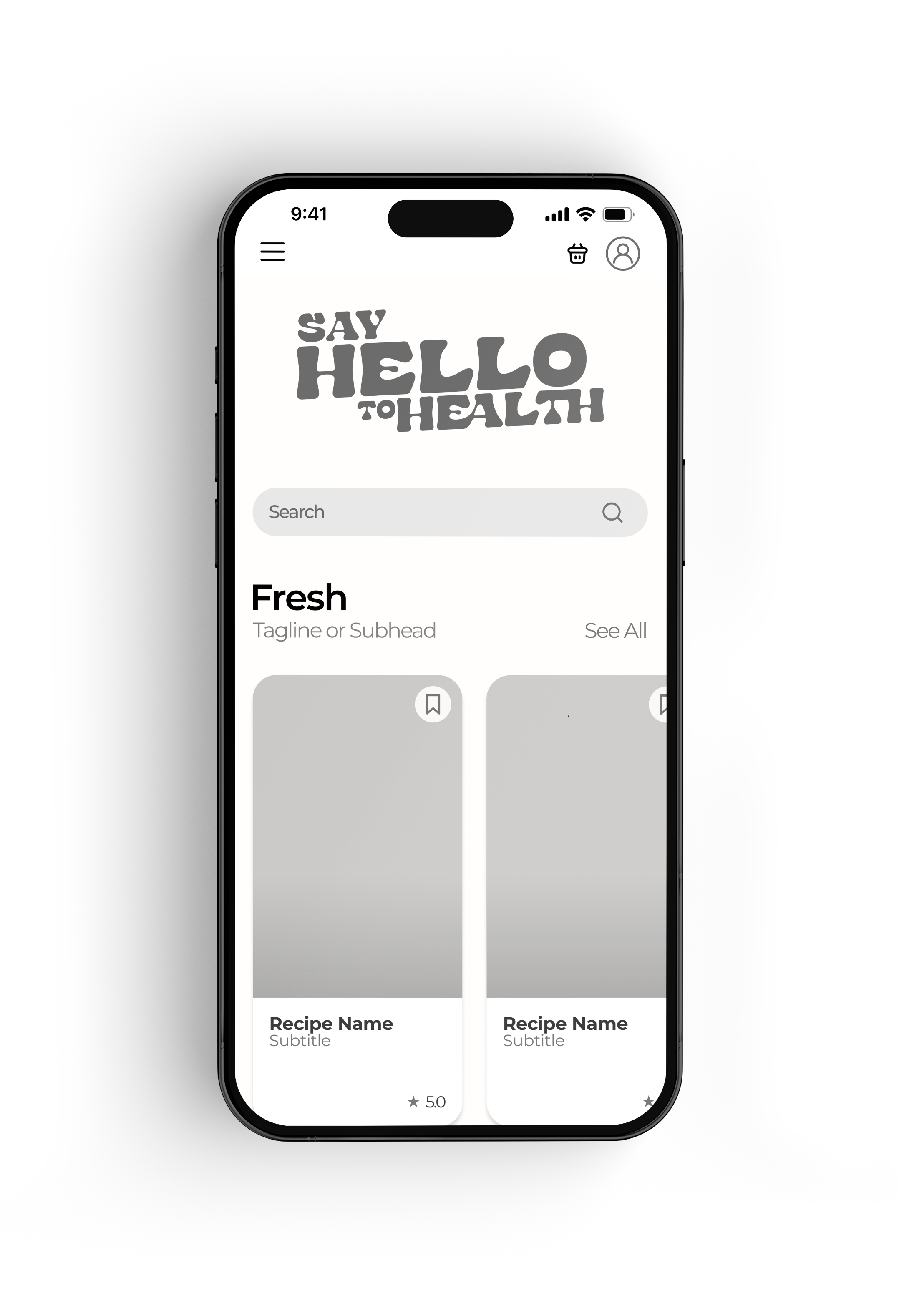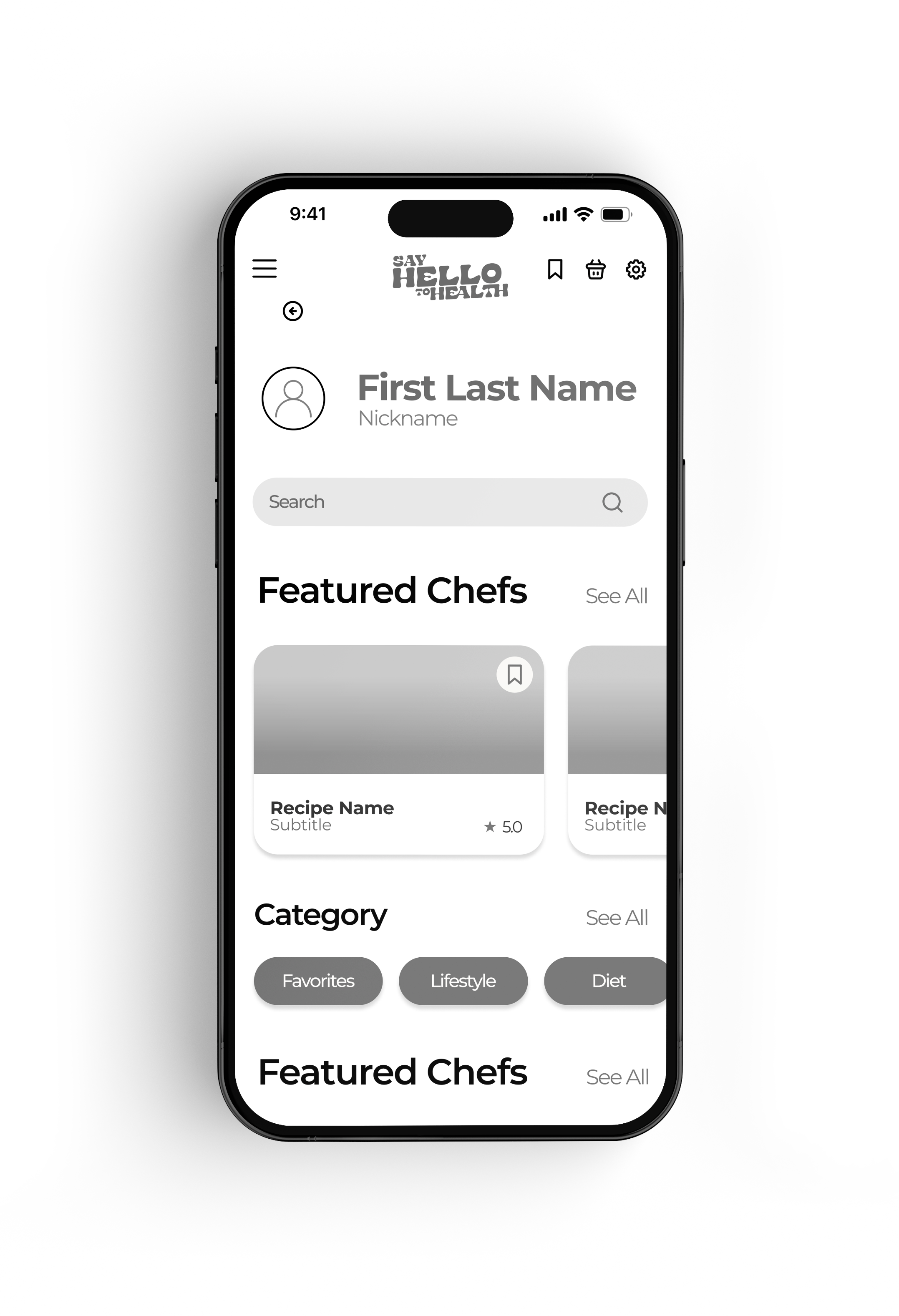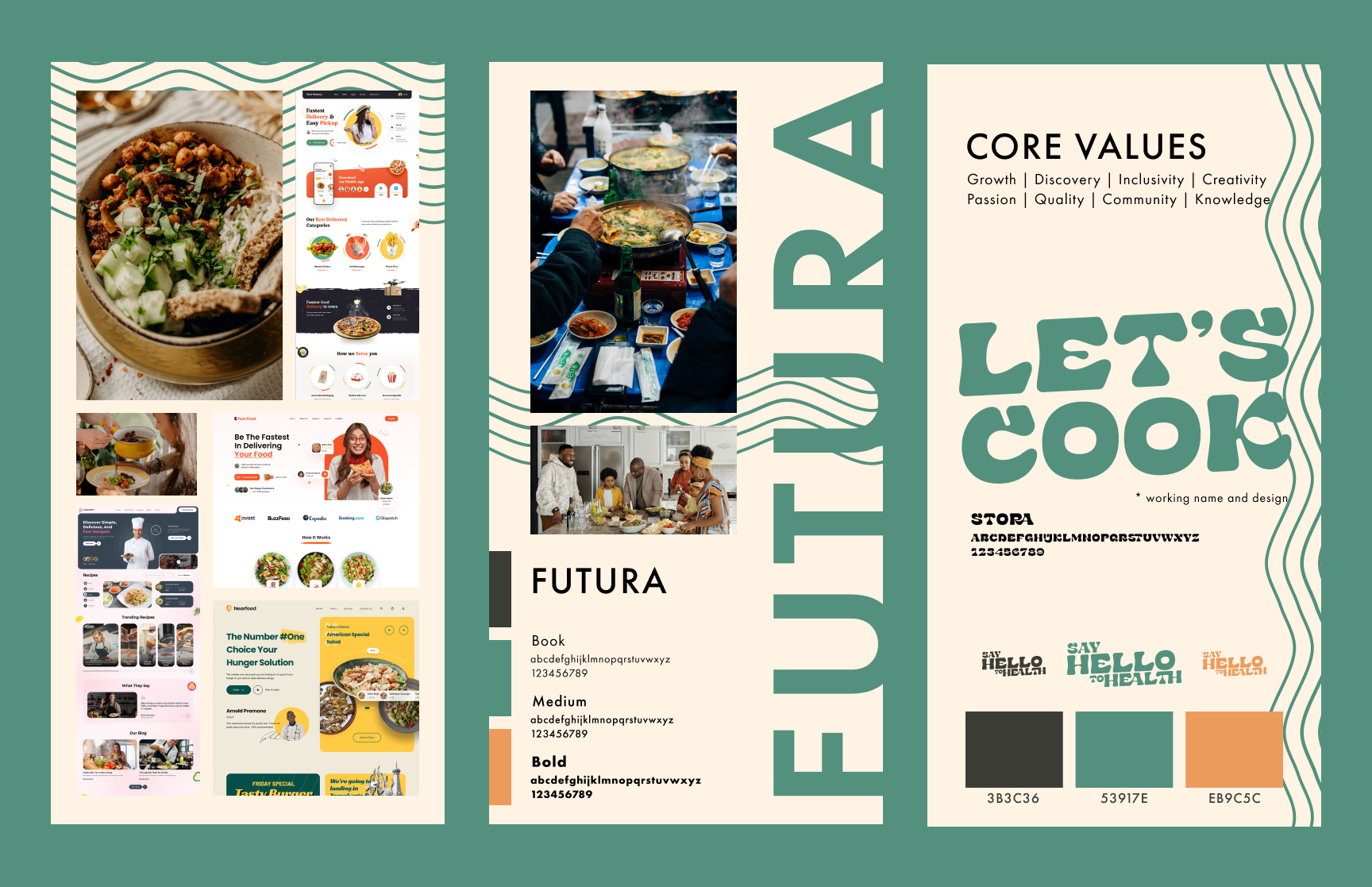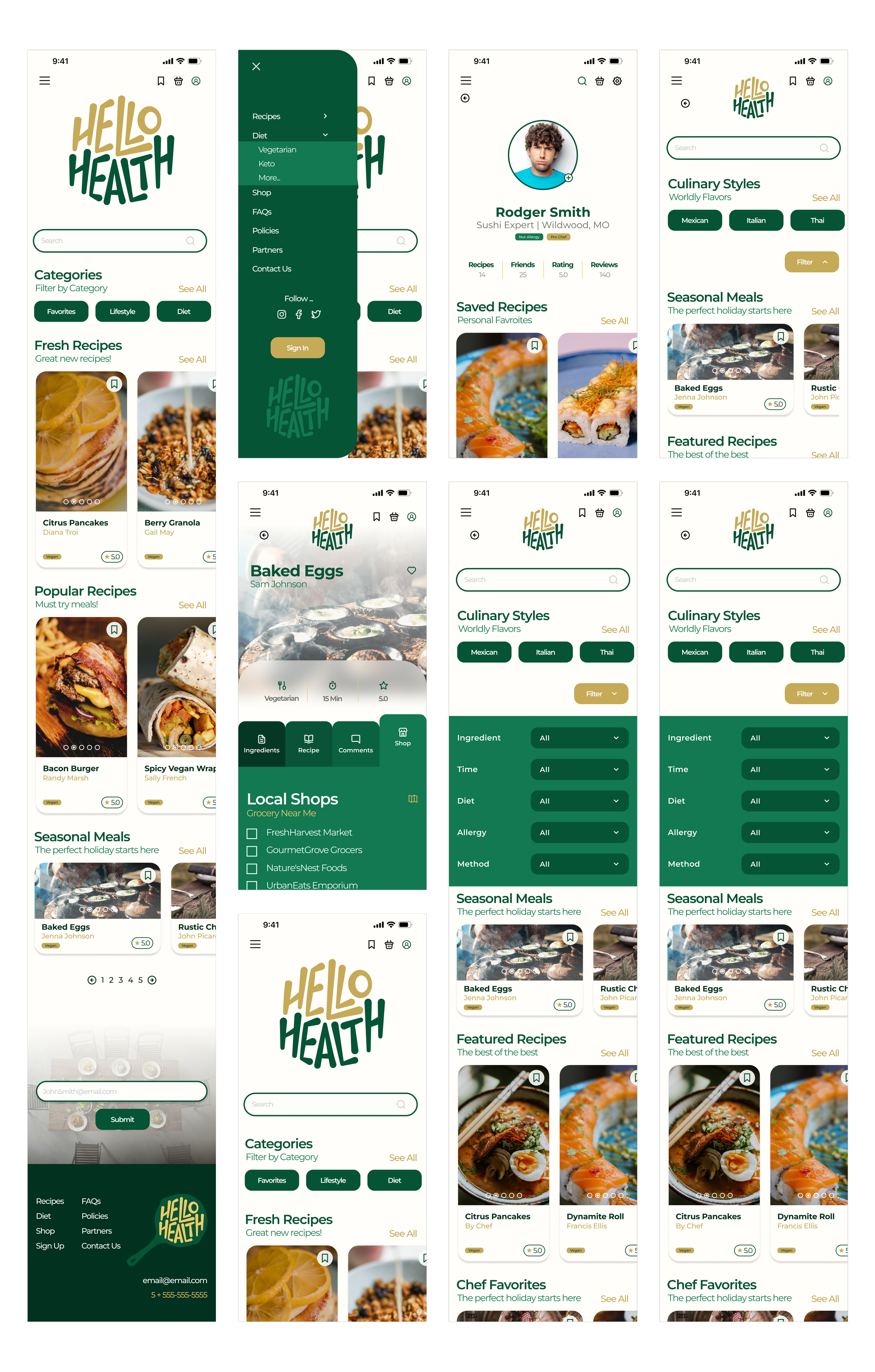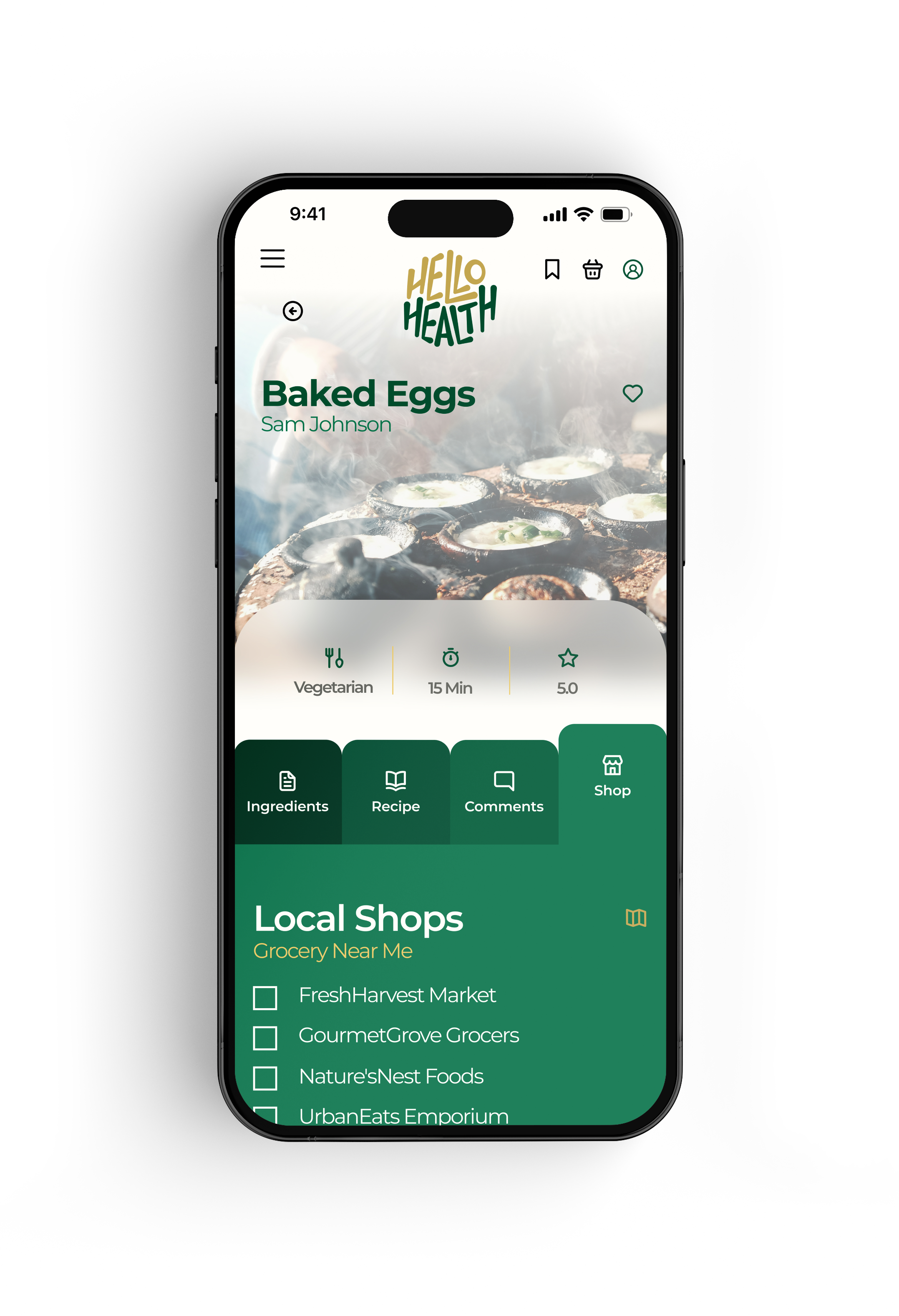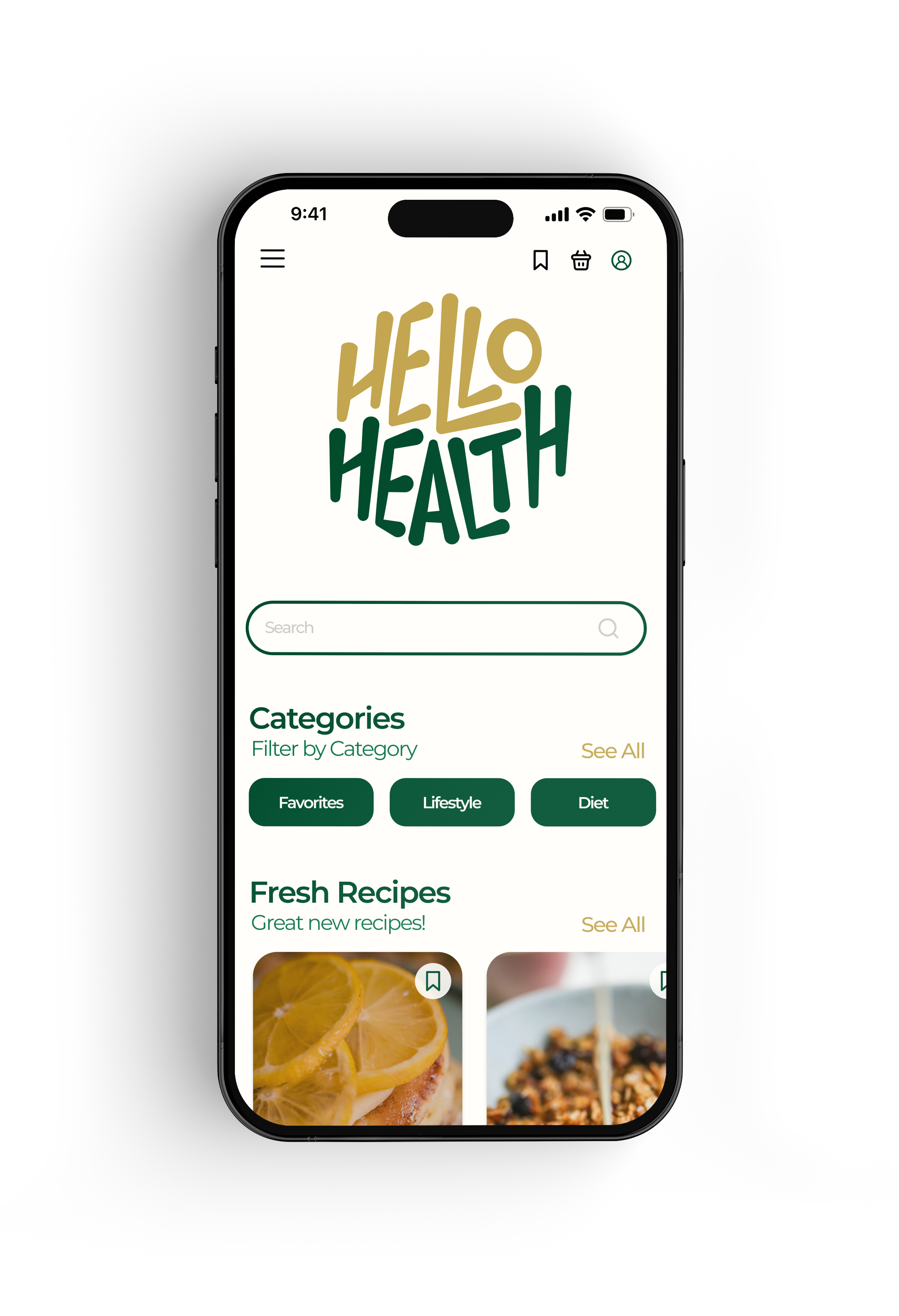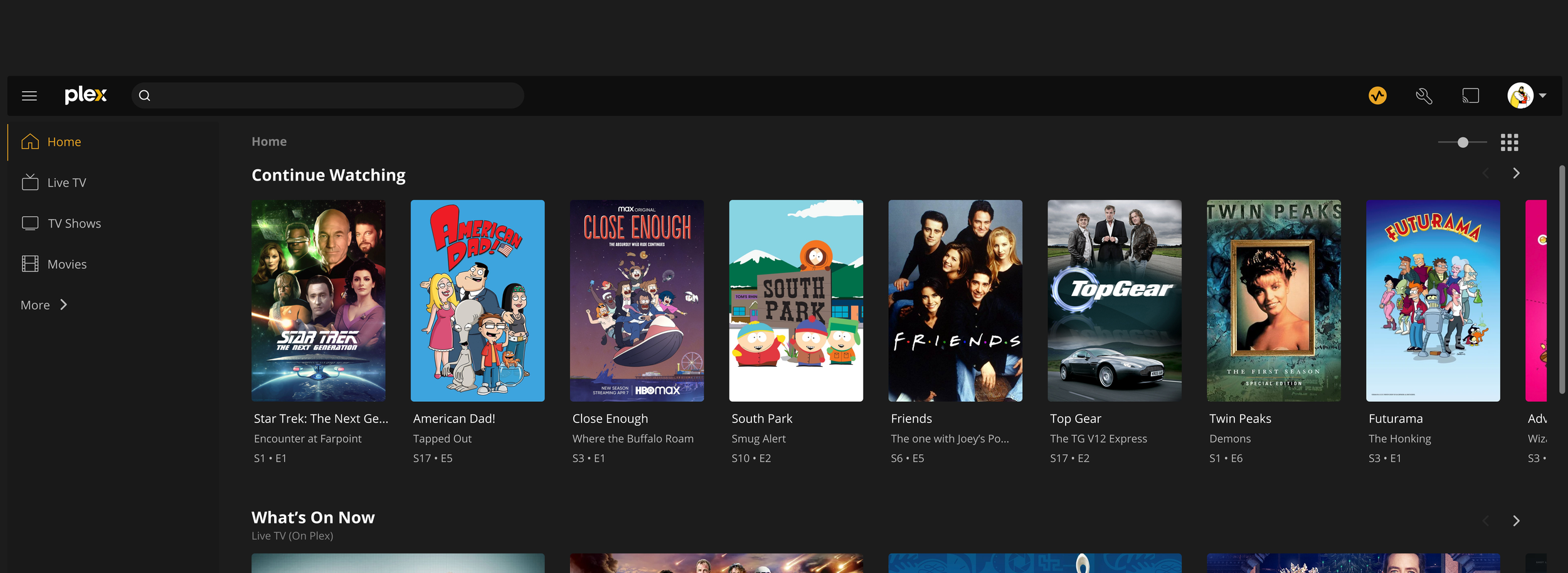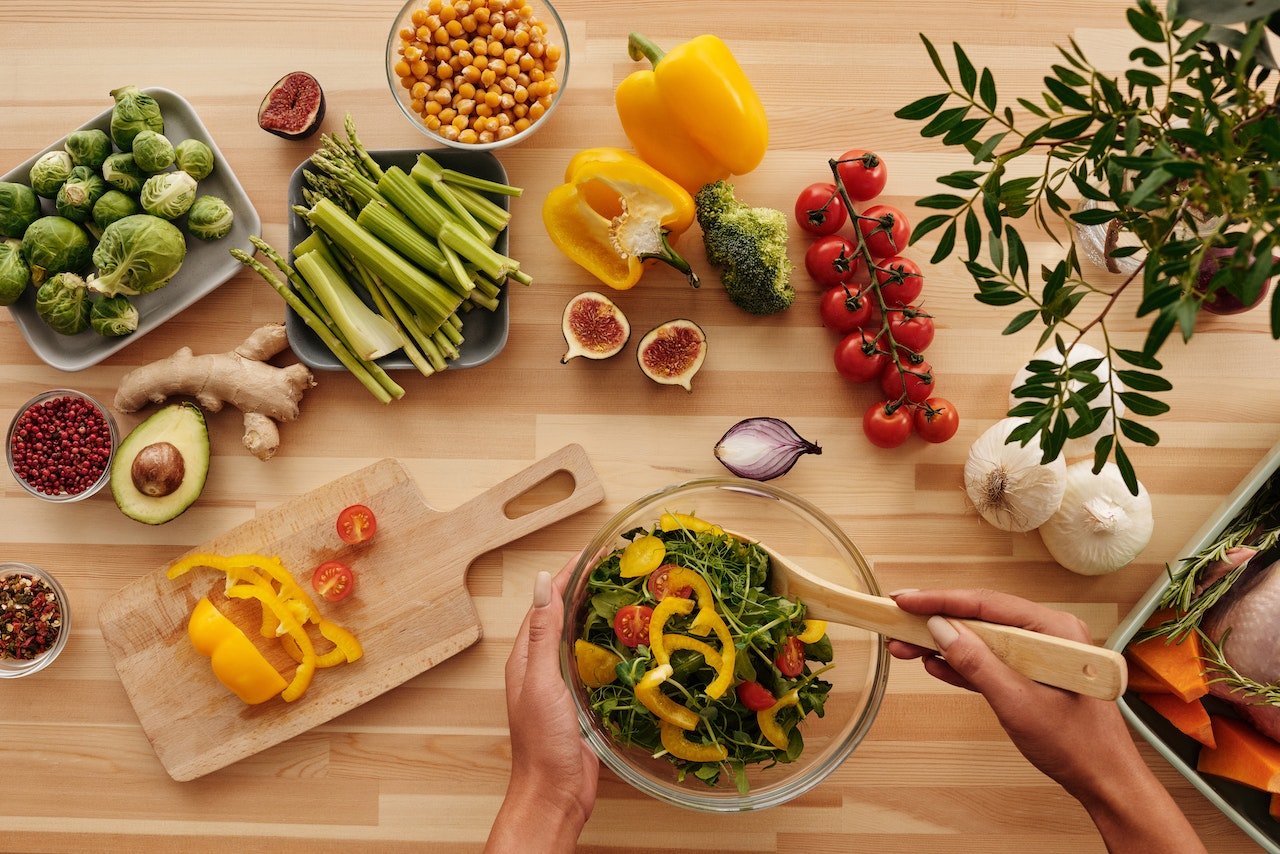
Hello
Health!
socially sourced recipes + ideas

Overcoming the obstacles of healthy cooking can prove quite challenging, primarily due to insufficient knowledge and skills, a scarcity of recipe ideas, conflicting information, and a lack of support and motivation. The objective is to alleviate these difficulties by providing access to a community-based recipe database that encourages positive experiences and facilitates communication.
My Role: UX Researcher & Designer / UI Designer Timeline: 4 Months
Design Process
-

Empathize
Research Plan
User Interviews
Competitive Analysis -

Define
Project Goals
HMW & POV Statements
Affinity Map
User Persons -

Ideate
User Flow
Task Flow
Sitemap
Sketches -

Design
UI Kit
Branding
Wireframes
Hi-Fidelity Prototype -

Test
Usability Testing
Feedback
Refine
Solution
User Research Plan
Healthy cooking can be challenging due to a few factors such as a lack of knowledge and skills, limited recipe ideas, conflicting information, and a lack of support and motivation. How can users share information and remove assumptions about cooking? How do novice users approach healthy cooking, and how can we improve their experience?
Research
Goals
The goal is to enhance users' cooking experience by understanding their challenges, motivations, dietary restrictions, and cultural needs. By identifying these factors, we can provide customized solutions to overcome obstacles, encourage skill development, offer relevant information, and assist in ingredient acquisition for a more enriching cooking journey.
Research
Objectives
To identify the specific difficulties that users face in the kitchen
Understand users’ motivations for cooking
To gain insight into users' dietary restrictions and cultural preferences
To identify how users acquire their ingredients (Grocery shopping, home delivery, garden)
To gauge users’ level of technical ability in the kitchen
To evaluate users’ current cooking knowledge, and interest in developing skills
To determine the sources from which the user is currently obtaining recipes.
Identify preferred learning methods (hands-on, online tutorials, cooking classes)
User Interviews
Kelly R.
Homemaker
47
Mark O.
Business Owner
40
Kayla N.
Massage Therapist
39
Samantha R.
Industrial Designer
32
Olivia E.
Full Time Student
20
Sam L.
Full Time Student
25

Research
All users have had trouble sourcing ingredients for specific recipes.
Recipe websites and blogs are viable sources for recipes but pose challenges for some users.
Community engagement would be a welcomed addition to sourcing recipes and enhancing knowledge.
Healthy cooking is a concern for some, but not for everybody.
Social media enhances users experiences, and can enrich an individuals cooking experience.
“finding the right ingredients can be tough”
-
Hard to follow recipes
Impact: Users with time budgets and limited skills will seek other options instead of cooking if they feel it’s too hard or takes too long.
Goal: Provide clear and easy-to-follow instructions that any user could understand. Social aspects of the platform can empower users to seek help within the community. -
Acquiring ingredients
Impact: Users tend to abandon a recipe if they’re not able to acquire the proper ingredients.
Goal: To enhance user trust and satisfaction, we aim to establish connections between users and both online and local retailers. -
Cooking with dietary needs
Impact: The main issues users face is not being able to find a recipe that works for their dietary needs. This causes an increase in bounce rates while users search multiple sites to find what they need.
Goal: To provide a platform that focuses on dietary needs that users trust, and feel comfortable navigating.
Competitive Analysis
-
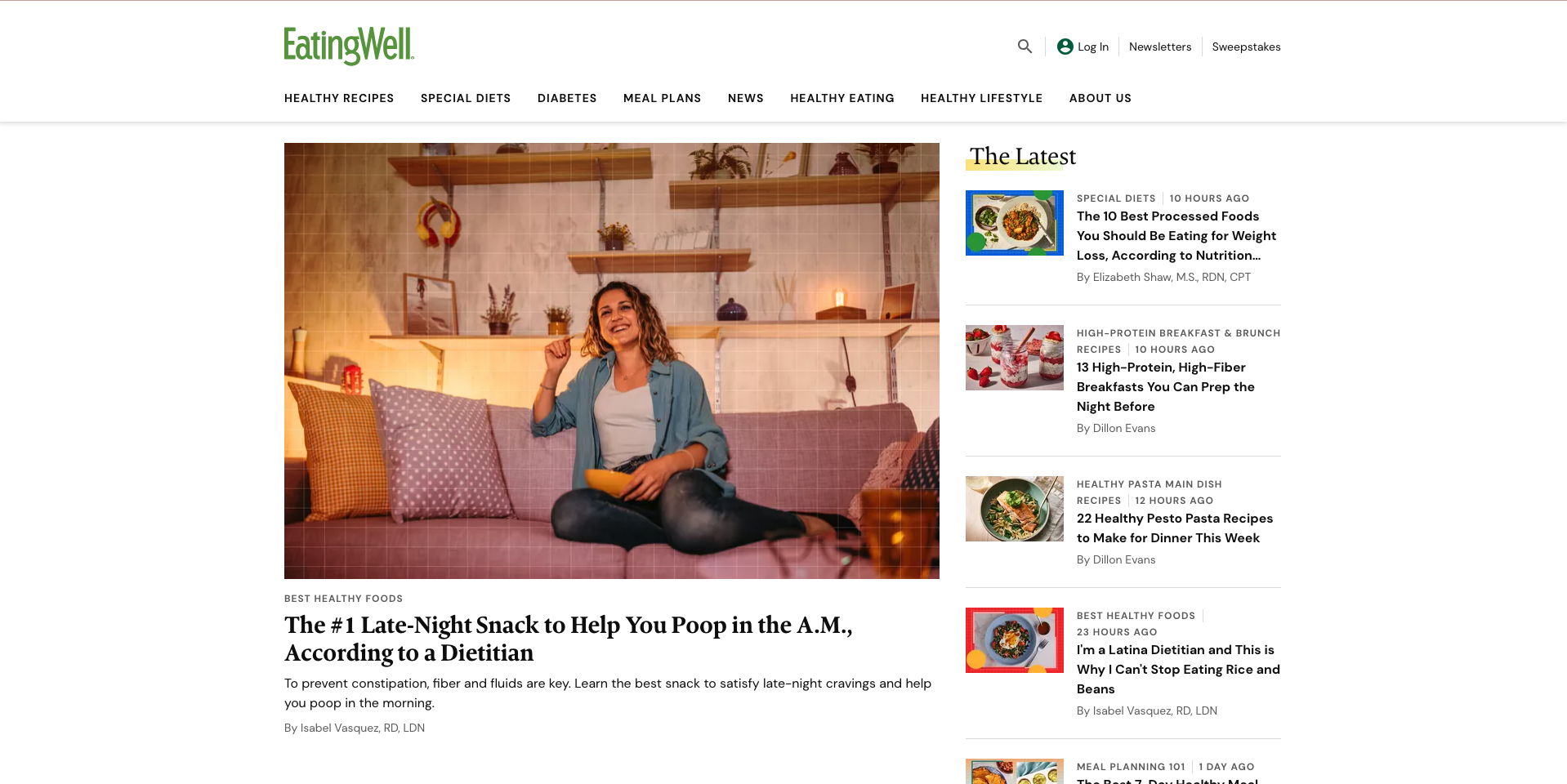
Eating Well
Eating Well is an online publication focusing on eating healthy and making healthy choices. They cater to a wide audience and some specific dietary needs. They have an established 30 years, and a good amount of subscribers. They also offer users with tips on how to improve their cooking.
Potential Demographic: Users of all ages
Pricing: Free
Strengths: Free, recipes, cooking tips, unique diets considered
Weaknesses: No discussions or ratings
-
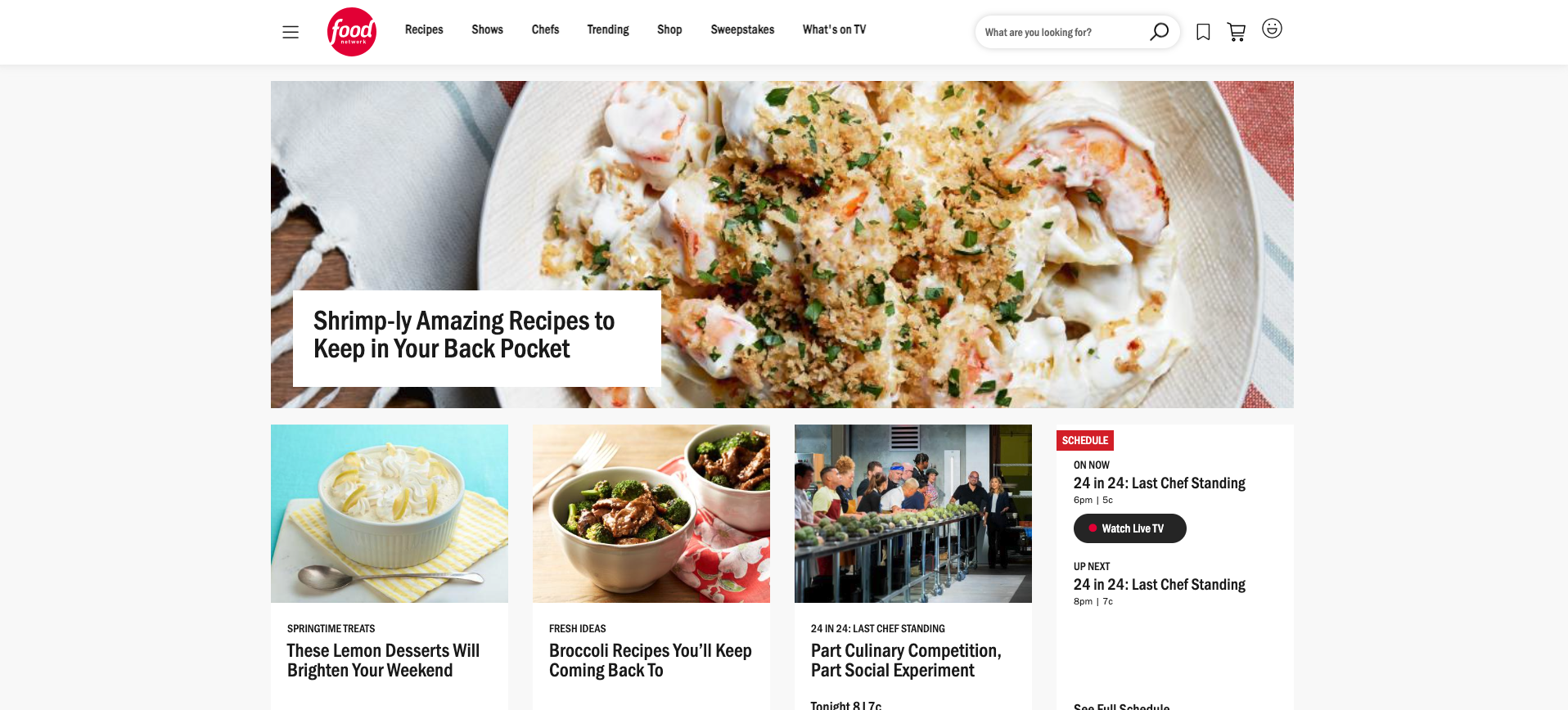
Food Network
Food Network is a professional publication and television network. They offer many food-related publications and programs that aim to inform users on all things food. Users will trust their opinion and can back that up with the views of professional chefs, and food writers.
Potential Demographic: Users of all ages
Pricing: Free
Strengths: Free, trusted name, backed by professional chefs
Weaknesses: Limited access to dietary-specific content, no user feedback
-
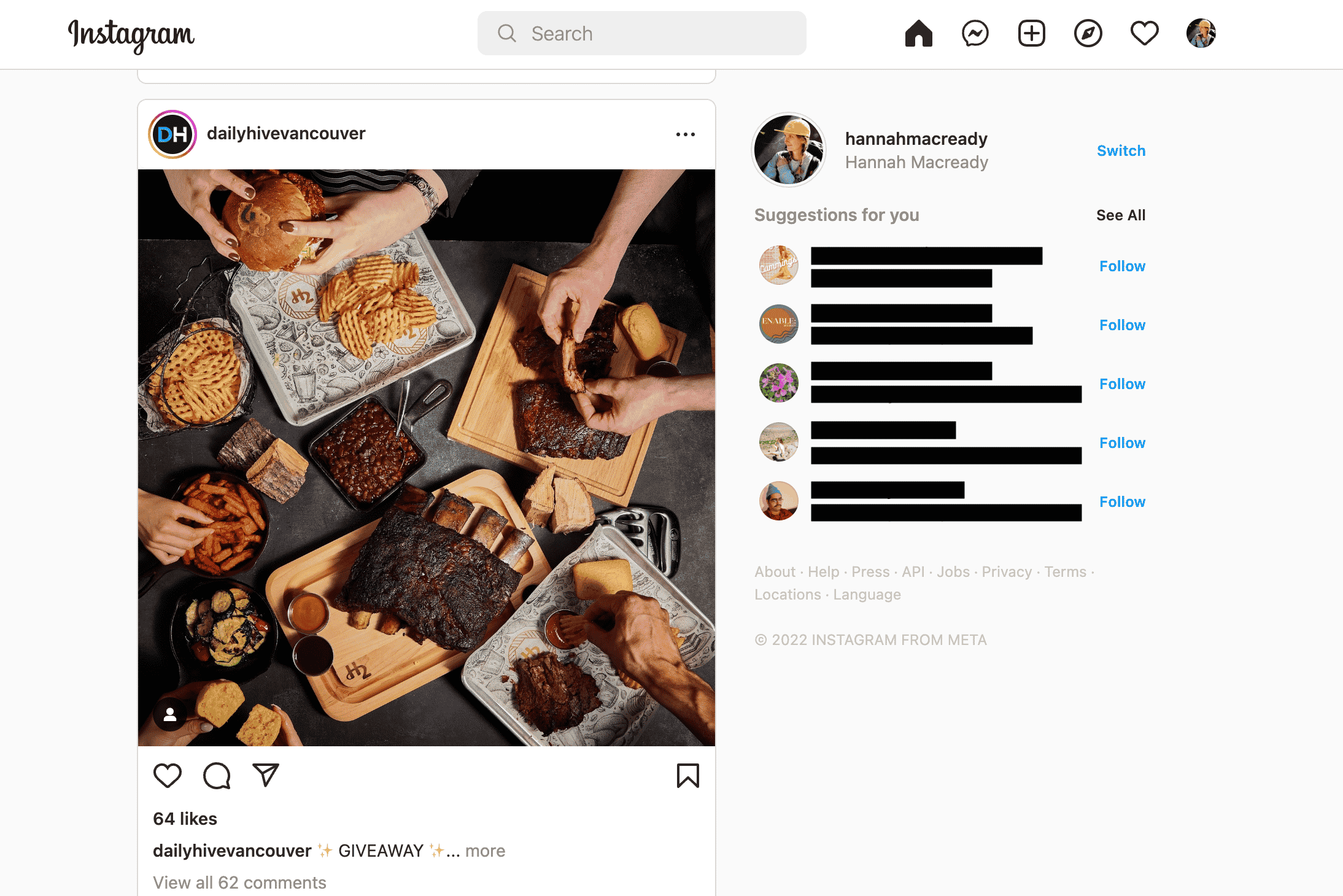
Instagram
Instagram is a social media site. Its users can follow each other and tune in on what they have to say. While cooking isn’t a primary focus for Instagram there are many resources hosted on their platform that could inform and educate users.
Potential Demographic: Users of all ages
Pricing: Free
Strengths: Free, wide range of user content, International access’
Weaknesses: Mainly mobile-focused, lack of user trust
Project Goals
Business Goals
To cultivate an active community that nurtures users of varying cooking expertise.
To ensure users feel confident by providing them with knowledge through shared testimonials, videos, and meticulously crafted recipes.
To provide users with adequate resources for acquiring ingredients.
Educate users about preparing meals that work with their dietary restrictions, and needs.
Create an online platform that encourages users to explore new cooking techniques while providing them with the confidence to try them and share their experiences with other users.
User Goals
Learning to incorporate alternatives in recipes to provide healthy meals for family members. with dietary restrictions
To learn to manage time better when preparing complicated meals.
Learn to prepare simple, nutritious meals on a budget.
Build confidence in the kitchen and overcome the fear of experimenting with new recipes.
Technical Considerations
Social sharing and user interaction encourage users to share cross-platform.
UI cards that provide a consistent, predictable, and comfortable experience for all users.
User Submitted videos, and photographs alongside their recipes to reinforce their process to enhance clarity for other users.
Concerns
How do we build trust with users?
What sort of incentive system could be offered that would encourage users to provide accurate feedback and prevent misuse of the platform?

HMW
HMW Statement #1
How might we sympathize more with users with dietary restrictions to understand their issues to provide a more enriched cooking experience that builds confidence, and enhances their culinary skills.
HMW Statement #2
How might we provide better and more reliable access to hight quality ingredients to users?
HMW Statement #3
How might we provide users with a structure that will make cooking times more precise?
HMW Statement #4
How might we foster a sense of community that stands out and encourages user engagement with the many other platforms that already exist?
POV
POV Statement #1
My goal is to tackle the obstacles and pressures encountered by individuals with dietary restrictions and specific needs. I strive to empower them by providing guidance on cooking within their limitations, enabling them to enhance their culinary skills and build their confidence in the kitchen.
POV Statement #2
I’d like to explore ways of providing users with access to high-quality ingredients because this emerged as a common issue among all of my research participants.
POV Statement #3
I’d like to explore ways of providing information to users who are on a time budget, and cannot afford to spend too much time in the kitchen.
POV Statement #4
I’d like to explore ways to encourage users to connect with one another to share their experiences with cooking because their personal insights can help users with similar abilities boost their confidence and encourage them to try new tings.
Affinity Map
The Affinity mapping suggests that users struggle most with acquiring ingredients and finding recipes that work for their cooking knowledge, dietary restrictions, and family structure. These things have validated my original thought that a social community approach to cooking would benefit users by providing them with the tools, and knowledge to feel more comfortable cooking, and possible workarounds for their challenges.
User Personas
User Flows
Taking feedback from the interviews into account; the userflow was designed to make navigating to the recipe as simple as possible. A few participants expressed their issues with having to scroll through many paragraphs, and ads to find the actual recipe they’re looking for.
Task Flows
Many users were considered when designing these task flows. I wanted to ensure they seemed familiar to users of any experience level.
Sitemap
Basic site structure to ensure a simple navigation for the user. The sitemap will serve as the foundation for the app structure.
Sketches
The original sketches for the project.

Lo-fi Wireframes
In the beginning stages of the project, I had a good idea of the overall structure and navigation. The choice to change the name ultimately helped solidify the overall brand identity.

Branding & Usability
The original design featured only a single category on the main screen. The category slider was moved up based on user feedback.
Profile
The profile started with a stripped down design. The future design features additional information on the main screen, and a larger avatar.
Mood board
Original concepts for the brand identity, and overall feel.
UI toolkit
The overall branding and design system used for this app is outlined below. I wanted to develop every element and component from scratch to learn more about the process.

Hi-fi Wireframes
These wireframes showcase the usability and functionality of the app. The upcoming user testing will determine what works, and what needs more work.
Usability Test

Tabbed Recipes
Most users expressed their dislike for the structure of recipe websites and blogs. This digital recipe card is designed to make following recipes easier and to encourage users to cook new things.
Branding & Usability
The final design features a more freeform logo to match the tone of the color palette. This screen also shows the updated category slider and the option to bookmark recipe cards.
Prototype
Give the prototype a try and let us know if you have any feedback you’d like to share!
Email us with your suggestions, and thoughts. We’d love to hear from you!

Reflection & next steps
Reflecting on this project, I find it was a rewarding experience that allowed me to connect with a diverse group of users, each facing challenges in sourcing ingredients for specific recipes. While recipe websites and blogs offer valuable resources, they also present hurdles for some users, underscoring the need for more accessible and user-friendly solutions. This project highlighted the potential of community engagement in sourcing recipes and enhancing culinary knowledge, demonstrating that a collaborative approach could significantly benefit users.
Healthy cooking emerged as an important concern for many, though not universally. This diversity in priorities emphasized the need for personalized solutions that cater to different user preferences and health goals. Social media played a crucial role in enriching the cooking experience, offering users inspiration and a platform for sharing their culinary journeys. This project also taught me the importance of setting aside my own instincts to genuinely listen to users and understand their unique needs, which is crucial for developing user-centric solutions.
Looking forward, I am excited about exploring the potential of gamification to foster community connections. Implementing a token system to validate users' credibility could enhance trust and engagement within the community. Overall, this project has provided valuable insights into the intersection of technology, community, and cooking, and I am eager to continue exploring innovative ways to support and connect users in their culinary endeavors.

